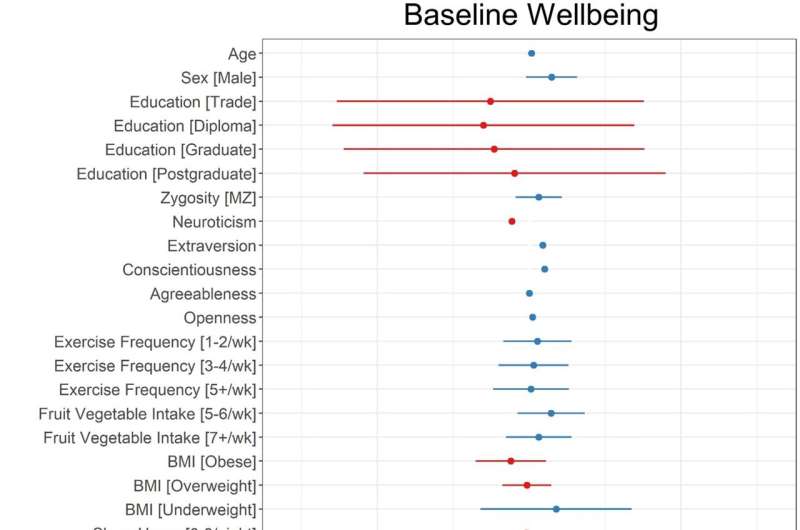Neuroscience Research Australia and the University of New South Wales, Australia, research has examined the sociodemographic, psychosocial, cognitive and life event predictors of well-being. The study, published in Scientific Reports is titled "Predicting well-being over one year using sociodemographic factors, personality, health behaviors, cognition, and life events." The team found a slight well-being advantage to being a conscientiousness extravert with a good workout routine.
The study repurposed data from 1,017 healthy adults enrolled in TWIN-E (Twin study in Well-being using Integrative Neuroscience of Emotion), a 2012 study looking for endophenotype markers of mental health that included personality evaluations based on web-based neurocognitive tests.
The results showed that neuroticism, extraversion, conscientiousness and cognitive reappraisal were the strongest predictors of well-being at the initial assessment. Extraversion was the strongest predictor of change in well-being, followed by the extent to which the individual perceived themselves to have experienced positive or negative events over the one-year period.
One explanation offered by the authors is the tendency for individuals higher in extraversion to have more abundant social connections that may facilitate maintenance or improvement in well-being over time. However, there was no capture of this information anywhere in the data.
What does jump out from the data provided, though not part of the current study, is the large swings in individual assessment categories as correlated to well-being. For example, getting more than eight hours of sleep per night was negatively correlated to well-being in the baseline assessment and was the most significant correlation to positive well-being in the follow-up. There were also dramatic flips in positive and negative correlations to exercise frequency, low body mass index and smoking behavior (past and current).
Additionally, a sustained negative impact on well-being was associated with spending time with family as well as volunteering three or more times per week.
The researchers suggest that while personality traits are useful predictors of well-being, recent life events and health behaviors are also important.



Recommended Comments
There are no comments to display.
Join the conversation
You can post now and register later. If you have an account, sign in now to post with your account.
Note: Your post will require moderator approval before it will be visible.